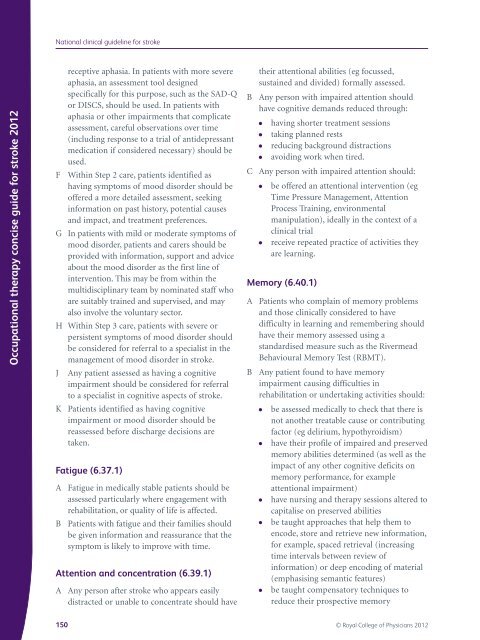national-clinical-guidelines-for-stroke-fourth-edition
national-clinical-guidelines-for-stroke-fourth-edition
national-clinical-guidelines-for-stroke-fourth-edition
Create successful ePaper yourself
Turn your PDF publications into a flip-book with our unique Google optimized e-Paper software.
Occupational therapy concise guide <strong>for</strong> <strong>stroke</strong> 2012<br />
National <strong>clinical</strong> guideline <strong>for</strong> <strong>stroke</strong><br />
receptive aphasia. In patients with more severe<br />
aphasia, an assessment tool designed<br />
specifically <strong>for</strong> this purpose, such as the SAD-Q<br />
or DISCS, should be used. In patients with<br />
aphasia or other impairments that complicate<br />
assessment, careful observations over time<br />
(including response to a trial of antidepressant<br />
medication if considered necessary) should be<br />
used.<br />
F Within Step 2 care, patients identified as<br />
having symptoms of mood disorder should be<br />
offered a more detailed assessment, seeking<br />
in<strong>for</strong>mation on past history, potential causes<br />
and impact, and treatment preferences.<br />
G In patients with mild or moderate symptoms of<br />
mood disorder, patients and carers should be<br />
provided with in<strong>for</strong>mation, support and advice<br />
about the mood disorder as the first line of<br />
intervention. This may be from within the<br />
multidisciplinary team by nominated staff who<br />
are suitably trained and supervised, and may<br />
also involve the voluntary sector.<br />
H Within Step 3 care, patients with severe or<br />
persistent symptoms of mood disorder should<br />
be considered <strong>for</strong> referral to a specialist in the<br />
management of mood disorder in <strong>stroke</strong>.<br />
J Any patient assessed as having a cognitive<br />
impairment should be considered <strong>for</strong> referral<br />
to a specialist in cognitive aspects of <strong>stroke</strong>.<br />
K Patients identified as having cognitive<br />
impairment or mood disorder should be<br />
reassessed be<strong>for</strong>e discharge decisions are<br />
taken.<br />
Fatigue (6.37.1)<br />
A Fatigue in medically stable patients should be<br />
assessed particularly where engagement with<br />
rehabilitation, or quality of life is affected.<br />
B Patients with fatigue and their families should<br />
be given in<strong>for</strong>mation and reassurance that the<br />
symptom is likely to improve with time.<br />
Attention and concentration (6.39.1)<br />
A Any person after <strong>stroke</strong> who appears easily<br />
distracted or unable to concentrate should have<br />
their attentional abilities (eg focussed,<br />
sustained and divided) <strong>for</strong>mally assessed.<br />
B Any person with impaired attention should<br />
have cognitive demands reduced through:<br />
● having shorter treatment sessions<br />
● taking planned rests<br />
● reducing background distractions<br />
● avoiding work when tired.<br />
C Any person with impaired attention should:<br />
● be offered an attentional intervention (eg<br />
Time Pressure Management, Attention<br />
Process Training, environmental<br />
manipulation), ideally in the context of a<br />
<strong>clinical</strong> trial<br />
● receive repeated practice of activities they<br />
are learning.<br />
Memory (6.40.1)<br />
A Patients who complain of memory problems<br />
and those <strong>clinical</strong>ly considered to have<br />
difficulty in learning and remembering should<br />
have their memory assessed using a<br />
standardised measure such as the Rivermead<br />
Behavioural Memory Test (RBMT).<br />
B Any patient found to have memory<br />
impairment causing difficulties in<br />
rehabilitation or undertaking activities should:<br />
● be assessed medically to check that there is<br />
not another treatable cause or contributing<br />
factor (eg delirium, hypothyroidism)<br />
● have their profile of impaired and preserved<br />
memory abilities determined (as well as the<br />
impact of any other cognitive deficits on<br />
memory per<strong>for</strong>mance, <strong>for</strong> example<br />
attentional impairment)<br />
● have nursing and therapy sessions altered to<br />
capitalise on preserved abilities<br />
● be taught approaches that help them to<br />
encode, store and retrieve new in<strong>for</strong>mation,<br />
<strong>for</strong> example, spaced retrieval (increasing<br />
time intervals between review of<br />
in<strong>for</strong>mation) or deep encoding of material<br />
(emphasising semantic features)<br />
● be taught compensatory techniques to<br />
reduce their prospective memory<br />
150 © Royal College of Physicians 2012


